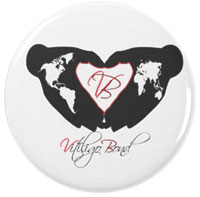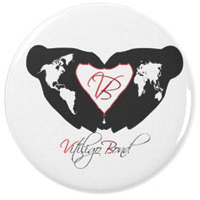June is Vitiligo Awareness Month
Author by Rina Shah The Arpan Group

Imagine finding white spots on your skin that spread for no apparent reason. This change in physical appearance can be terrifying and confusing. Living with vitiligo can make it difficult to be comfortable in your own skin. The lack of public understanding and overt discrimination faced by many vitiligans can make simple daily tasks, like grocery shopping or going to work, a constant struggle.
Vitiligo, a non-contagious disorder where white patches appear on the skin, affects one percent of the population. Depigmentation occurs when melanocytes, the cells responsible for skin pigmentation, are unable to function. Until recently, the cause of vitiligo was unknown, though recent research now indicates the disorder may be a result of autoimmune, genetic, neural, or viral issues.
For some, living with vitiligo can lead to self-induced isolation, self-esteem issues, and mental health concerns. For others like Courtney Simon, vitiligo gives her life meaning and truly drives her ambition. Pursuing a bachelor’s degree in social work, Simon credits her experience dealing with vitiligo as the reason for her future career choice.
 A senior at Southeastern Louisiana University, Simon is a typical college student in most ways – working, studying, and socializing with close friends and family. She learned she had vitiligo when she was only 11-years-old. At the cusp of her teenage years, an already pivotal age for any youth, Simon struggled with understanding her changes in physical appearance and learning how to build relationships with peers. Today, she pursues a healthy, active lifestyle and cherishes every moment of her life.
A senior at Southeastern Louisiana University, Simon is a typical college student in most ways – working, studying, and socializing with close friends and family. She learned she had vitiligo when she was only 11-years-old. At the cusp of her teenage years, an already pivotal age for any youth, Simon struggled with understanding her changes in physical appearance and learning how to build relationships with peers. Today, she pursues a healthy, active lifestyle and cherishes every moment of her life.
Not all vitilgans take their disorder in stride as Simon does. Aside from the physical aspect of the disorder, many vitiligans suffer from psychological issues such as depression and mood disorders. With no known cure on the horizon, it can be difficult to see the silver lining. Though treatment options are available for concealing the skin, some treatments can be extremely harmful, causing other diseases and cancer.
Organizations, like Vitiligo Bond Inc. (VBI), provide vitiligans with access to information about the disorder and safe treatments, and more importantly, a private support group where members can share their challenges in a safe, understanding environment. For members like Simon, the Facebook support group is her “vitfamily,” one she cannot live without. Simon explains “ … we have similarities, we encourage each other, we laugh, we cry, we motivate each other because of something we live, breathe, and cope with in our everyday life.”
Founded in November 2010 by Natasha Pierre McCarthy, VBI provides information resources and access to a supportive community for those living with vitiligo. Since then, VBI has grown into a worldwide support group, through its Facebook and social media presence. VBI’s reach and popularity grows with each passing day. For those who rely on VBI as a source of comfort and release, the organization has given them not only the confidence to embrace the skin disorder, but also a circle of friends who empathize with the challenges they face on a daily basis.
 McCarthy, a current vitiligan, began the organization out of her own experience with the disorder and much soul-searching. She was 27-years-old when diagnosed with vitiligo, and her first task was to learn as much as she could about the disorder. She then began to experiment with stigmatism by wearing make-up some days and going without on others. In the end, McCarthy realized you just have to be comfortable with the reality and begin to embrace life’s challenges. So while VBI was born out of a need to provide a safe haven and a discussion forum for those struggling the disorder, the organization now looks to ways to build greater public understanding. With a private Facebook support group that is now282 members strong, McCarthy is on a mission to educate the public.
McCarthy, a current vitiligan, began the organization out of her own experience with the disorder and much soul-searching. She was 27-years-old when diagnosed with vitiligo, and her first task was to learn as much as she could about the disorder. She then began to experiment with stigmatism by wearing make-up some days and going without on others. In the end, McCarthy realized you just have to be comfortable with the reality and begin to embrace life’s challenges. So while VBI was born out of a need to provide a safe haven and a discussion forum for those struggling the disorder, the organization now looks to ways to build greater public understanding. With a private Facebook support group that is now282 members strong, McCarthy is on a mission to educate the public.
This June 2013, McCarthy is fully embracing the spirit of the first-ever Vitiligo Awareness Month in Georgia, when Vitiligo Bond Inc. (VBI) will launch a series of events designed to drive awareness about the skin disorder. Events will include a youth empowerment camp, launch reception and book signing, one-day conference, and fundraising gala. “Greater public understanding will lead to less stigmatism. I hope that more vitiligans are able to go about their daily lives without the added stress of feeling judged or shunned,” states McCarthy.
 One of the cornerstone activities of Vitiligo Awareness Month will be VBI’s I Am Precious Youth Empowerment Camp, which offers youth living with vitiligo an opportunity to develop lasting relationships with peers and learn how to cope with the challenges of living with a disorder little understood by the general public. During the course of the one-week camp, youth will participate in workshops designed to build confidence and self-esteem, promote healthy living habits, and encourage long-term career development.
One of the cornerstone activities of Vitiligo Awareness Month will be VBI’s I Am Precious Youth Empowerment Camp, which offers youth living with vitiligo an opportunity to develop lasting relationships with peers and learn how to cope with the challenges of living with a disorder little understood by the general public. During the course of the one-week camp, youth will participate in workshops designed to build confidence and self-esteem, promote healthy living habits, and encourage long-term career development.
McCarthy hopes that the events of Vitiligo Awareness Month will inform the public not only about the disease, but also make vitiligans feel comfortable embracing their disorder. “Vitiligo does not start and end with Michael Jackson. You can live with vitiligo, and you don’t have to be forced to bleach your skin in order to appear acceptable in public.”
To learn more about how VBI seeks to empower vitiligans worldwide through access to a private online support group, raise public awareness and empathy about the skin disorder, and increase funding for research into the causes, prevention, and treatment of vitiligo., please visit http://vitiligobond.org/. VBI, a registered nonprofit 501c(3) organization, continually seeks in-kind support for events as well as donations to support its private online support group, drive public awareness, and strengthen community bonds through its public events.
 About the Author
About the Author
Rina Shah is the CEO and founder of The Arpan Group, a solutions firm that specializes in developing public relations campaigns to capture untouched ethnic markets. From press releases and media kits to marketing materials and by-line articles, The Arpan Group customizes solutions based specifically on the client’s needs. For more information about how The Arpan Group can assist your company or organization, visit www.thearpangroup.com or call (703) 651-6670.































